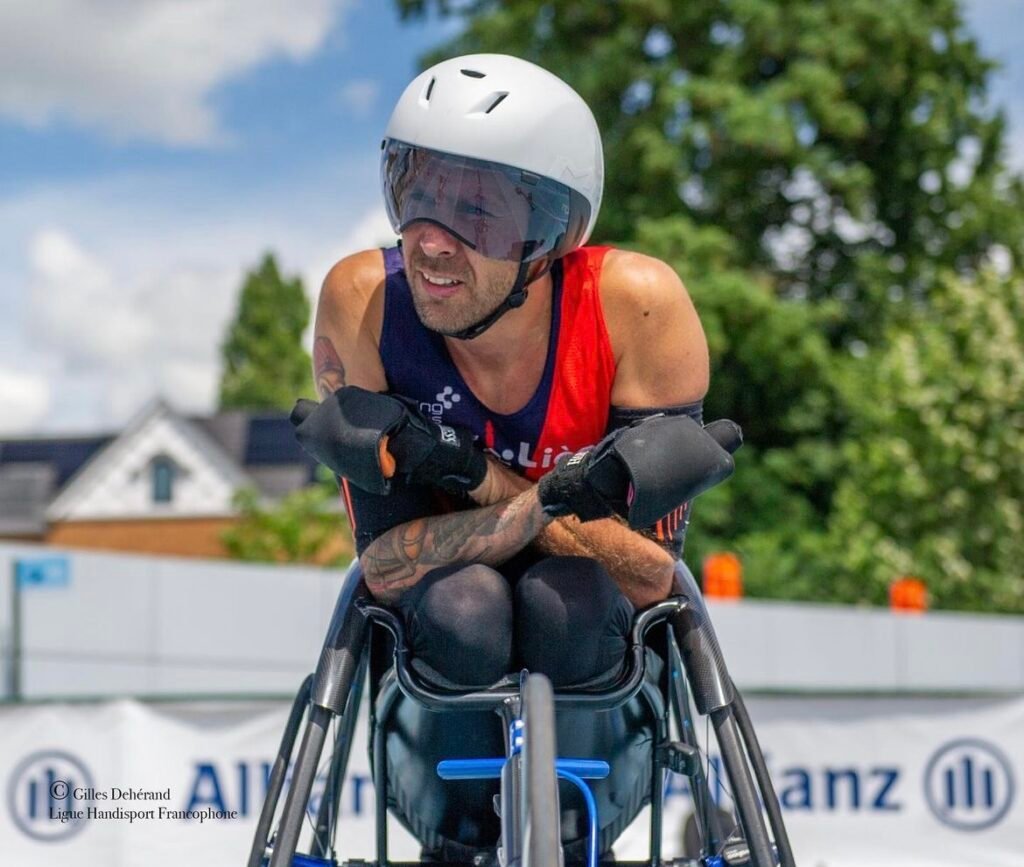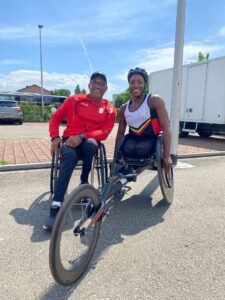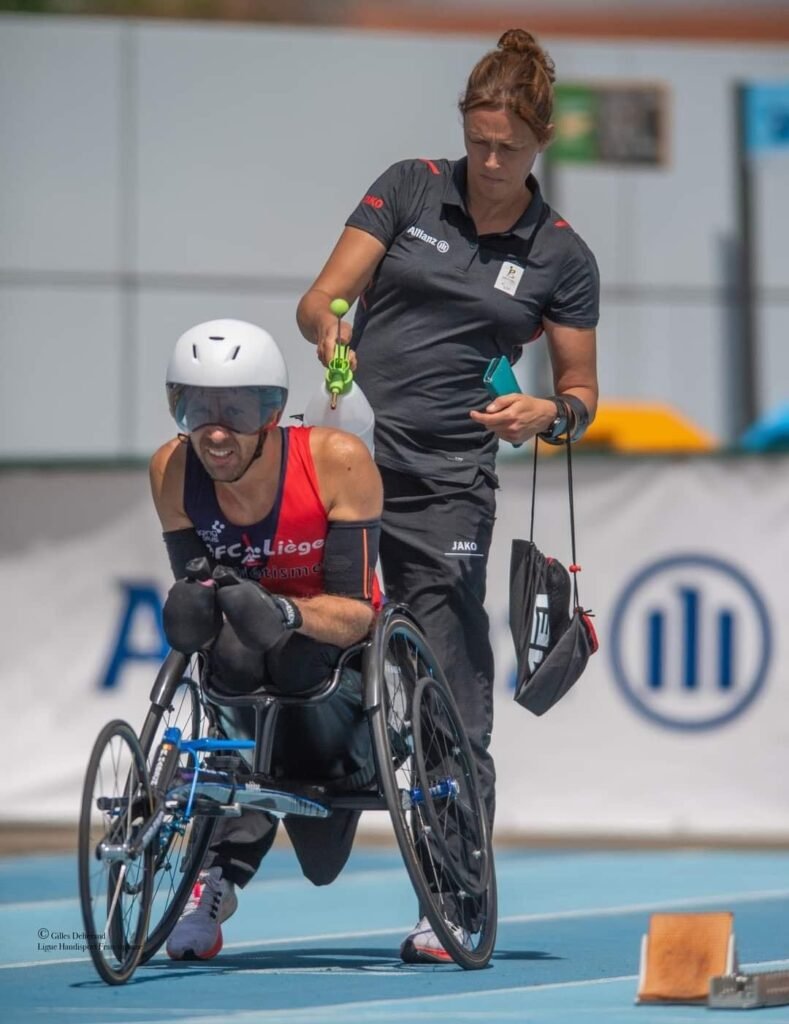Written by Trackandmemes, June 2, 2023
Roger Habsch, already a world record-holder in the 100m, first in 19'' 68 last year at the Belgian championships, and recently in 19'' 32 at the Daniela Jutzeler Memorial in Switzerland, will never cease to impress. Roger has goals, like qualifying for the Paralympic Games to be held in Paris in 2024. The kind of competition our Belgian athlete is already familiar with, having walked away with two bronze medals at the Tokyo 2021 Games, one in the 100m and the other in the 200m.
But in Belgian athletics, aiming for performance, with or without a handicap, is not always easy. And Roger can testify to that.

What does being a Paralympic athlete in Belgium mean in terms of opportunities and difficulties?
In terms of opportunities, it's complicated. Disabled sport is still in the shadow of able-bodied sport. There's a problem in terms of communication and promotion of the sport. From a media point of view, we're talking about it a lot more than we used to, but it's still not enough compared to able-bodied people.
For the Games, for example, there were journalists on hand to interview the able-bodied at the world soccer championships, but there were no longer any staff to cover the Paralympics.
It's a real shame. And it's still taboo. There are a lot of people who don't look and who simply don't know about our disability.
Opportunities come to people who are open-minded enough.
And what about the LBFA?
I'm registered with the LBFA for the race number, and yet the Elite athletes listed on the site include Cynthia Bolingo, Anne Zagré, Camille Laus, etc. I'm not on the site, but I'm also Elite.
In a few decades, this will change. But for now...
Does this kind of inequality also apply to financial matters?
For example, an able-bodied athlete who won a gold medal at the Tokyo Games earned 50 000€, while a handicapped athlete gained 15 000€, with the same medal around his neck.
In the able-bodied category, the prize money was €30,000 for silver and €20,000 for bronze.
And back home, in the Paralympics, the silver medallist earned €10,000 and the 3rd place winner €7,500.
That's when you really see the difference between the able-bodied and the disabled. We have even more expenses. My chair, for example, costs €15,000. So we have to find sponsors and try to get by. We have to find solutions, partners or crowdfunding, otherwise the equipment becomes prohibitively expensive.
What are the different categories of disabled athletes running on rolling chains?
In all, there are four categories. T51, T52, T53 and T54.
A paraplegic is a person with paralysis of the lower limbs, and a tetraplegic, he’s a person like me, so he's paralysed on both the lower and upper levels.
I have no abdominal muscles and partial paralysis in my hands. Being paralysed both above and below, I'm in the T51 category.
T54, they are paraplegics or amputees, but they have all their abdominal muscles. Léa Bayekula, a Belgian athlete, falls into this category.

In the T53 category, these are paraplegics who no longer have abdominal muscles or lower limbs, but they have their shoulders, arms, hands... So they are mainly paralysed in their legs and trunk.
And T52, these are people whose legs are paralyzed, who no longer necessarily have abdominal muscles, and who have a problem with a hand or forearm, or who have certain difficulties with their upper limbs.
What else would we need to improve in our country to promote performance?
First of all, I'd like to tell beginners to hang in there and don't give up. If you want it, you can do it. And you'll get there sooner or later, even if it's complicated.
What needs to be improved is support. We have support, but it's different from that of able-bodied people. And when you're a beginner and you don't have any support, it's even more complicated because you have to buy equipment and you don't necessarily have the money. And finally, you have to find the money to compete.
I think there are a lot of athletes who miss out on a lot of things because they're not motivated, because they don't have a solution to perform, to train, to even find a coach... Because we don't really have any infrastructures!
For example, I train in Liège, but I don't have a coach there to train me.
My coach, Pascale Henkinbrant, comes from Namur. I went through an association that buys prostheses for amputees... My coach used to train there, so that's where it all started. But it's clear that it's still complicated for us to find someone who's good, who's trained, who's available and who's nearby.

It's not as if I could go to Belek with the able-bodied team, for example, and have a coach there to train me.
Integrated
What would also be really nice would be to have integration with the able-bodied. For example, when the able-bodied go on a training course, it would be interesting if we were directly invited to go with them. Because we'd also like to be with several people rather than going off on our own.
And even when it comes to infrastructure... You pay more because you're the only one taking the rooms. I went to Belek, Turkey, with the rest of the delegation and it was really great!
How do you manage your life as a dad and athlete?
When the kids are at school, I take the opportunity to do my training.
I train more or less 20 hours a week, so from time to time, when they're off, they come with me to the track. Otherwise, I always try to do it early in the morning before they wake up, or on rollers depending on the weather. If I don't have time during the day to go to the track, then I roll in the evening when they're asleep, to try to spend as much time with them as possible and still be able to look after them.
But it's clear that it's not always easy to combine the two with competitions and being away from home a lot.
For example, I split up a year ago, and if my competition falls on a Saturday during the time when I have to take the children home, then I have no choice. I have to cancel my competition.
My children are still a priority. I can't forget my father aspect because my children are there. I think the time I spend with my children is much more important than sport.
We know Roger as a world record-holder, but we don't talk as much about his fatherly side. And yet, you seem to be doing just fine!
That's true. I'm not doing too badly in terms of the times I set and my role as a father. Knowing that I'm single and have to deal with everything that's going on at home too.
By the way, how did your daughter react when she heard you'd broken the world record?
She was jumping. She was so happy. She even wrote a little song. I think my kids are really proud of their dad.

How are you currently preparing for Paris 2024?
I was in a bit of doubt at the start of the season because my situation was a bit complicated, with the kids and my separation... I was ill three days before the first race I did in Oordegem, so I didn't really perform well.
Then, when I went south, I said to myself. we'll see what happens. Things will be done as they should be done. To set this record in 19'' 32, it's clearly a real boost. You'd think that, even though training was complicated throughout that period, I'd still worked hard. I even lost 8 kilos.
Qualification for this summer's world championships in Paris has already been secured. And that's a good thing.